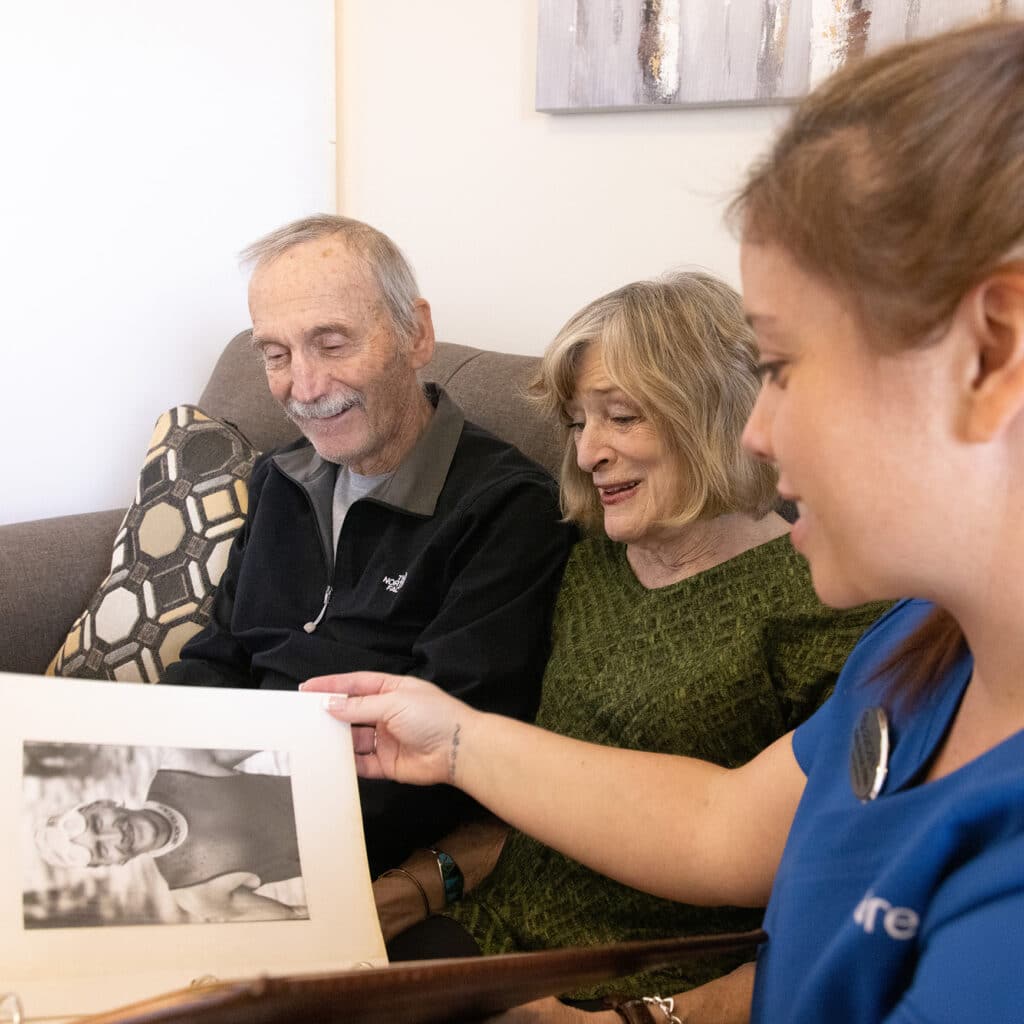Alzheimer’s and Dementia Home Care
Alzheimer’s and dementia are conditions that impact memory, thinking, and behavior. They are challenging for both clients and their families. Understanding these conditions can help in providing better care. In-home Alzheimer’s care offers many benefits that help improve the quality of life for those affected.
Our services include:
- Companion care
- Light housekeeping
- Laundry
- Meal preparation
- Errand running
- Accompany to MD visits
- Transportation to appointments
- Medication reminders
- Personal care services
- Assistance with bathing, grooming, & dressing
- Assistance with toileting & incontinence care
- Assistance with transferring from bed to chair
The Importance of In-Home Care for Dementia Clients
In-home dementia care allows clients to stay in familiar surroundings, reducing anxiety and confusion. It provides comfort and stability, which is often disrupted when moving to a new place. This approach supports both emotional and psychological well-being, making it an excellent option for many families.

Developing Personalized Care Plans
Creating a personalized care plan starts with a thorough assessment of the client’s needs. This involves understanding their medical history, daily routines, and personal preferences. Family input is crucial in this process to ensure the care plan meets the specific needs of the client. Key components of a care plan include support for daily living activities, medical care, and cognitive support strategies.
Training and Qualifications of Dementia Caregivers
Caregivers providing Alzheimer’s home care undergo specialized training to handle dementia challenges effectively. This training includes managing behavioral changes, providing physical care, and offering emotional support. Continuous education and support for caregivers ensure they stay updated with the latest care techniques, maintaining high-quality care.
Holistic Strategies in Dementia Care
A holistic approach to dementia care addresses physical, emotional, and cognitive needs. Techniques such as music therapy, physical exercise, and mental stimulation activities are used. Empathy is essential in this approach, helping caregivers build trust and rapport with clients, which is vital for effective care.
Let's Get Started
Home Safety Modifications for Dementia Clients
Ensuring a safe home environment is essential for dementia clients. This can include removing potential hazards, installing safety devices, and making modifications to reduce the risk of falls. Creating a comforting and familiar atmosphere can also help reduce anxiety and promote a sense of security.
Engaging Activities to Promote Cognitive Health
Engaging clients in brain-healthy activities can help slow the progression of dementia. Activities like puzzles, reading, and physical exercise stimulate the brain and improve overall well-being. Establishing daily routines is also important, as it helps reduce agitation and provides structure to the client’s day.
The Importance of Consistent Caregivers
Having consistent caregivers is vital for dementia clients. It helps build a trusting relationship and ensures that the care provided is tailored to the client’s needs. A reliable care team can significantly improve the client’s comfort and quality of life.
Comprehensive Support Services for Dementia Clients

How to Get Started
Initial Consultation and Assessment
The first step in securing dementia care is an initial consultation and assessment. During this meeting, our care expert will evaluate the client’s needs and develop a personalized care plan. This process ensures that the care provided aligns with the specific requirements and preferences of the client.
Making the Transition to Home Care
Making the transition to home care can be smooth with the right approach. Tips for a successful adjustment include open communication with the caregiver, gradual introduction of services, and involving the client as able in decision-making. Continuous support and regular check-ins help ensure the transition is comfortable for everyone involved.
Frequently Asked Questions about In-Home Alzheimer's and Dementia Care
Effective communication with a loved one who has Alzheimer’s or dementia involves maintaining eye contact, using simple sentences, speaking slowly, giving them time to respond, using names instead of pronouns, avoiding open-ended questions, using visual cues and gestures, and remaining client and supportive.
Financial resources for covering the cost of in-home Alzheimer’s and dementia care may include long-term care insurance, Veterans Affairs benefits, state and local programs, non-profit organizations, and caregiver support grants. It’s important to explore all available options and speak with a financial advisor for guidance.

